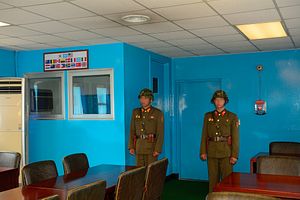A husband places his arm around his wife, who never remarried despite their 65 years apart; a son hugs the 88-year-old father he never had a chance to know — these are just some of the heart-wrenching images to emerge this week at reunions held for families separated by the Korean War.
Almost 400 South Koreans made a rare trip across the inter-Korean border on Tuesday to spend just 12 hours with 96 long-lost relatives at the Mount Keumgang resort in North Korea. Another 96 elderly South Koreans are due to make the same journey on Saturday.
While deeply affecting, the scenes of raw emotion at the periodic reunions, which were last held last year, obscure the cold calculation at the heart of what it is a strictly controlled and deeply political process.
The meetings themselves are tightly coordinated: not only are North Korean officials and South Korean journalists often present, the topics of conversations are carefully managed — South Korea’s Red Cross, which co-organizes the reunions, warns participants not to ask their North Korean relatives about the dictatorship or the state of the economy in their homeland.
Many past attendees have been left bitterly disappointed with their only chance to see their estranged family members before they die.
“In a word, they are miserable,” Lee Oh-hwan told The Wall Street Journal last week, describing the reunions she attended last year. “They were so poor. But they were so indoctrinated that they would just praise North Korea even when we were away from their minders.”
Other past participants described being on their guard even during the few moments they had alone with their relatives, fearful of being bugged — a possibility apparently raised by South Korean officials.
“I had a lot of things I wanted to ask, like about how my father and mother had lived before they died, but I couldn’t because I had to be sensitive about everything,” 82-year-old Jeon Ho-yeon, who was reunited with his brother, told the Associated Press.
Jeon and others like him are in fact the lucky ones, having been picked via a lottery. More than 60,000 others are still waiting for their chance, which for most will never come.
Yet, even for these fortunate few, their reunions aren’t really reunions at all — but final goodbyes.
“I couldn’t put it any better than Michael Kirby [the retired Australian judge who led the UN Commission of Inquiry on Human Rights in the Democratic People’s Republic of Korea] did when he said, ‘It is extremely cruel of the administration of [North Korea] and a breach of fundamental human rights to deny the opportunity for families to be reunited,’ and called the lottery for selecting those allowed to meet ‘a barbarous practice,’” Joshua Stanton, the author of the blog One Free Korea, told The Diplomat. “It is wrong to characterize a meeting as a ‘reunion’ if it ends with those on the North Korean side being abducted all over again.”

































